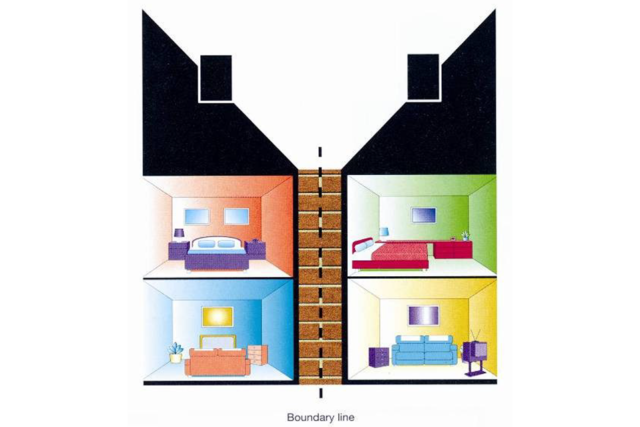The Party Wall Act 1996 is a crucial piece of legislation for property owners in England and Wales, particularly in densely populated cities like London.
The Act provides a framework for preventing and resolving disputes concerning party walls, boundary walls, and excavations near neighbouring buildings.
This comprehensive guide will cover everything property owners need to know about the Party Wall Act, including the role of a party wall surveyor in London.
1. Understanding the Party Wall Act
The Party Wall Act aims to facilitate development and prevent disputes between neighbours when undertaking certain types of construction work. The Act applies to:
- Party walls – walls that separate buildings belonging to different owners, such as the dividing wall between terraced or semi-detached houses.
- Party fence walls – walls that stand on the boundary line between two properties but do not form part of a building, such as a garden wall.
- Excavations near neighbouring buildings – when digging within 3 or 6 metres of a neighbouring building, depending on the depth of the excavation.
The Party Wall Act does not affect any requirement for planning permission, building regulations approval or other consent that may be required for the work.
2. Party Wall Notices
Before starting any work covered by the Party Wall Act, the property owner (the ‘Building Owner’) must serve a written notice on the affected neighbour (the ‘Adjoining Owner’). The notice must include:
- The name and address of the Building Owner
- A detailed description of the proposed work, including plans and drawings if necessary
- The proposed start date for the work
There are three types of Party Wall Notices:
- Party Structure Notice – for work directly affecting a party wall or party fence wall, such as cutting into the wall, raising its height, or demolishing and rebuilding it.
- Line of Junction Notice – for building a new wall either up to or astride the boundary line between two properties.
- Notice of Adjacent Excavation – for excavations within 3 or 6 metres of a neighbouring building, depending on the depth of the excavation.
Notices must be served at least one or two months before the planned start date, depending on the type of notice. If the Adjoining Owner agrees to the proposed work, the Building Owner can proceed. If the Adjoining Owner does not respond within 14 days or objects to the proposed work, a dispute arises, and both parties must follow the dispute resolution process outlined in the Act.
3. The Role of a Party Wall Surveyor
A party wall surveyor is a specialist who can help property owners navigate the complexities of the Party Wall Act. Their role includes:
- Advising on the requirements of the Act and the correct procedure for serving notices
- Assessing the proposed work and its potential impact on neighbouring properties
- Preparing a ‘Schedule of Condition’ report, which documents the existing condition of the Adjoining Owner’s property before work begins
- Negotiating and preparing a ‘Party Wall Award’, which sets out the terms and conditions for carrying out the work, including any necessary protection measures, access arrangements, and compensation for damage
- Monitoring the work to ensure it is carried out in accordance with the Party Wall Award, and resolving any disputes that may arise during the process
In the event of a dispute, both the Building Owner and the Adjoining Owner must each appoint a party wall surveyor. Alternatively, they can agree to appoint a single ‘Agreed Surveyor’ to act impartially for both parties. The surveyor(s) will then determine the dispute by making a Party Wall Award.
4. Party Wall Awards
A Party Wall Award is a legally binding document that sets out the terms and conditions for carrying out the work covered by the Party Wall Act. It typically includes:
- A description of the proposed work, including any necessary changes to the original plans
- The rights and responsibilities of both the Building Owner and the Adjoining Owner
- Any necessary protection measures, such as scaffolding or hoarding, to prevent damage to the Adjoining Owner’s property
- Access arrangements for the Building Owner and their contractors to carry out the work on the Adjoining Owner’s land, if required
- Compensation for any damage caused by the work, including the cost of making good or the payment of a financial settlement
- A timetable for completing the work, including any restrictions on working hours or methods
The Party Wall Award must be served on both parties, and the work must be carried out in accordance with its terms. If either party is unhappy with the Award, they can appeal to the County Court within 14 days of service, but this is rare in practice.
5. Costs and Fees
The Party Wall Act states that the Building Owner is usually responsible for the costs of serving notices, appointing surveyors, and preparing Party Wall Awards. However, the Act also allows the surveyor(s) to apportion costs between the parties in a fair and reasonable manner, depending on the circumstances of the case.
In conclusion, the Party Wall Act is an essential piece of legislation for property owners in London who are planning construction work that may affect their neighbours. By understanding the requirements of the Act and seeking the advice of a qualified party wall surveyor, property owners can ensure that their work is carried out legally




